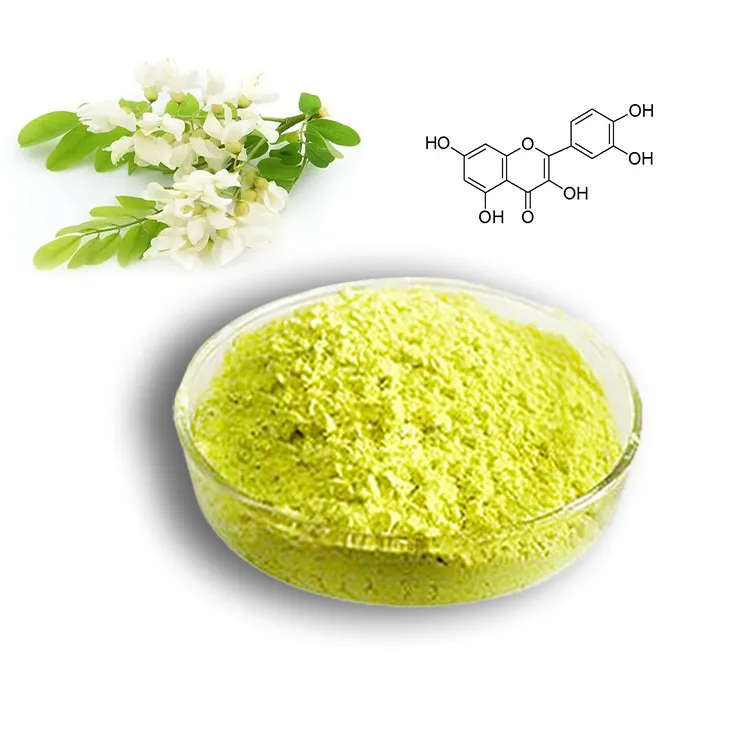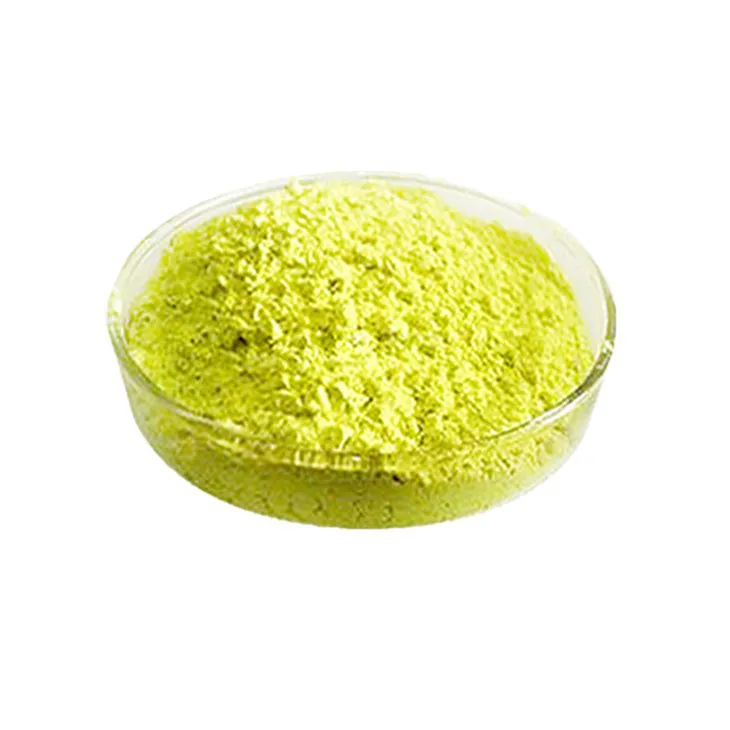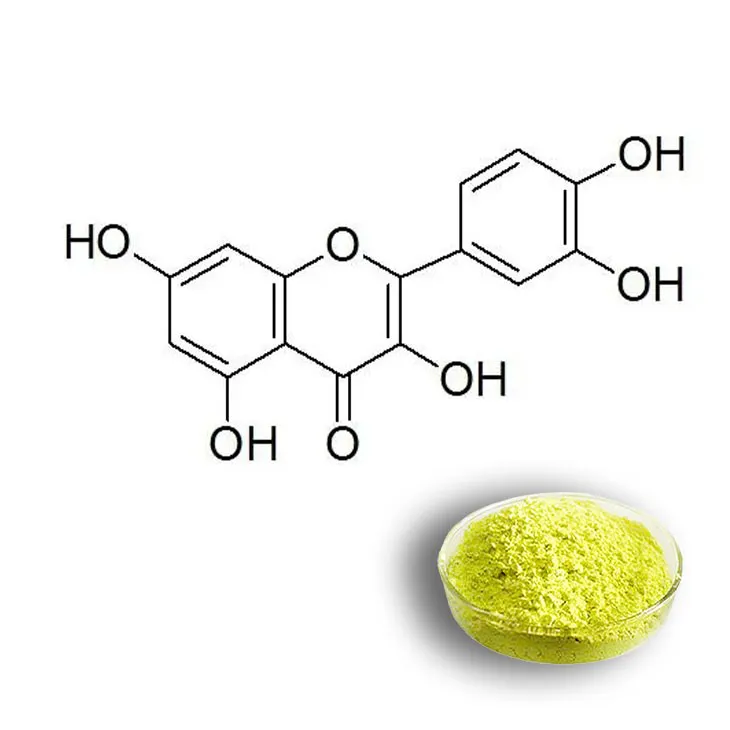- 0086-571-85302990
- sales@greenskybio.com
Who Should Not Take Quercetin?
2025-05-18

Quercetin is a plant flavonoid found in many fruits, vegetables, leaves, and grains. It is particularly abundant in onions, apples, berries, and tea. Known for its antioxidant and anti-inflammatory properties, Quercetin is often used as a dietary supplement to support overall health, diminish inflammation, enhance immunity, and potentially combat allergies. Despite its popularity and range of health benefits, Quercetin may not be suitable for everyone. Understanding who should avoid or exercise caution with quercetin is essential to ensure safe and effective use.
What is Quercetin?
Quercetin is a type of polyphenol belonging to a group of plant compounds known as flavonoids. It contributes to the vivid pigments in various fruits and vegetables and offers a host of health benefits due to its antioxidant properties. Quercetin helps neutralize free radicals, potentially reducing the risk of chronic diseases such as heart disease, cancer, and neurodegenerative disorders. Additionally, its anti-inflammatory effects contribute to reducing symptoms in conditions like arthritis and allergies.

Health Benefits of Quercetin
Quercetin has been studied for multiple health benefits, including:
1. Anti-Inflammatory Effects: Quercetin can reduce inflammation by inhibiting the production of pro-inflammatory cytokines and enzymes. This could benefit individuals suffering from chronic inflammatory conditions such as arthritis.
2. Antioxidant Support: As a potent antioxidant, quercetin can combat oxidative stress and may reduce the risk of developing chronic illnesses, including cardiovascular diseases and certain cancers.
3. Immune System Enhancement: Quercetin has been shown to modulate the immune system, potentially aiding in the prevention of infections and autoimmune conditions.
4. Allergy Relief: Quercetin could help alleviate symptoms of allergies by inhibiting the release of histamines, substances produced by the immune system that cause allergic reactions.
5. Cardiovascular Health: It may aid in lowering blood pressure and improving overall cardiovascular health by promoting vasodilation and improving endothelial function.

Potential Risks and Side Effects
While quercetin is generally considered safe for most people when consumed in moderate amounts through diet or supplements, it can cause adverse effects in some individuals. Common side effects include headaches, gastrointestinal discomfort, and tingling sensations. However, more serious interactions and contraindications need consideration.

Who Should Avoid Quercetin?
Given the potential side effects and drug interactions, certain individuals should avoid quercetin or use it only under medical supervision:
1. Pregnant or Nursing Women: There is limited scientific data on the safety of quercetin supplements during pregnancy and lactation. As a general rule, pregnant and breastfeeding women should avoid quercetin supplements due to the lack of conclusive evidence about safety and potential effects on the fetus or infant.
2. Individuals with Kidney Conditions: High doses of quercetin have been linked to an increased risk of kidney damage. Those with pre-existing kidney conditions should exercise caution or avoid quercetin altogether to prevent exacerbating their condition.
3. People on Blood-Thinning Medications: Quercetin might interact with blood-thinning medications like warfarin and aspirin. It can enhance the effects of these drugs, increasing the risk of bleeding. Individuals on anticoagulant therapy should consult their healthcare provider before taking quercetin.
4. Those on Chemotherapy: Quercetin can interact with certain chemotherapy drugs, potentially influencing their effectiveness. Some studies suggest quercetin might inhibit or alter the metabolism of these medications. It is crucial for cancer patients undergoing chemotherapy to discuss quercetin use with their oncologist.
5. Individuals with Liver Disorders: While not widely reported as hepatotoxic, high doses of quercetin might put additional strain on the liver. Those with liver disorders should take care to avoid potential complications or interactions.
6. People with Sensitive Stomachs: Quercetin can cause digestive upset, including nausea, diarrhea, and digestive irritation when taken in high doses. Those with sensitive stomachs or pre-existing gastrointestinal issues should start with lower doses and monitor their body's response.

Drug Interactions with Quercetin
Quercetin may interact with several medications by altering their absorption or efficacy. In addition to anticoagulants and chemotherapy drugs, quercetin can affect other medications:
- Antibiotics: Quercetin might reduce the effectiveness of certain antibiotics by interfering with their absorption and metabolism.
- Corticosteroids: There is evidence to suggest that quercetin may affect the metabolism of corticosteroid medications, impacting their efficacy.
- Statins: Quercetin may interfere with the metabolism of statins, drugs used to lower cholesterol levels, potentially impacting their effectiveness.
Tips for Safe Quercetin Use
For those considering quercetin, it is important to follow guidelines to ensure beneficial and safe use:
1. Consult a Healthcare Professional: Always consult your doctor or healthcare provider before starting quercetin, particularly if you have existing health conditions or are on medication.
2. Start with Lower Doses: Especially for those new to quercetin supplements, starting with a lower dose helps monitor how your body reacts. Gradually increasing the dose allows time to identify potential adverse effects.
3. Monitor for Side Effects: Even if you do not fall into any of the higher-risk groups, pay attention to changes in your health or any side effects that arise after starting quercetin supplementation.
4. Choose High-Quality Supplements: If you decide to take quercetin, opt for reputable brands that undergo third-party testing for quality assurance.
5. Follow Recommended Dosages: Stick to suggested dosages on supplement labels and avoid taking excessively high amounts without professional guidance.
Conclusion
Quercetin is recognized for its potential health benefits, ranging from anti-inflammatory effects to supporting cardiovascular health. However, it is not free from limitations and potential risks. While it can be a helpful addition to many people's health regimens, certain individuals need to avoid or carefully monitor its use, particularly those with specific medical conditions or those taking certain medications. Consulting a healthcare provider ensures that quercetin can be integrated safely into your lifestyle, allowing for its beneficial properties without unnecessary risk. Whether incorporated through diet or with supplements, quercetin remains a promising supplement for enhancing health and wellness when used responsibly.
- ▶ Hesperidin
- ▶ Citrus Bioflavonoids
- ▶ Plant Extract
- ▶ lycopene
- ▶ Diosmin
- ▶ Grape seed extract
- ▶ Sea buckthorn Juice Powder
- ▶ Fruit Juice Powder
- ▶ Hops Extract
- ▶ Artichoke Extract
- ▶ Mushroom extract
- ▶ Astaxanthin
- ▶ Green Tea Extract
- ▶ Curcumin
- ▶ Horse Chestnut Extract
- ▶ Other Product
- ▶ Boswellia Serrata Extract
- ▶ Resveratrol
- ▶ Marigold Extract
- ▶ Grape Leaf Extract
- ▶ New Product
- ▶ Aminolevulinic acid
- ▶ Cranberry Extract
- ▶ Red Yeast Rice
- ▶ Red Wine Extract
-
Red Wine Extract
2025-05-18
-
Peppermint Extract Powder
2025-05-18
-
Hawthorn Extract
2025-05-18
-
Okra Extract
2025-05-18
-
Alfalfa Meal
2025-05-18
-
Lemon Balm Extract
2025-05-18
-
Dandelion Leaf Extract
2025-05-18
-
Astaxanthin
2025-05-18
-
Artichoke Leaf Extract
2025-05-18
-
Eyebright Extract
2025-05-18





















